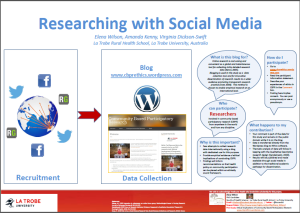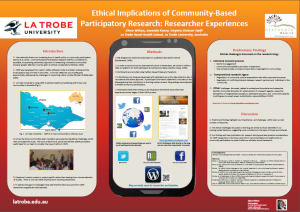International Institute for Qualitative Methodology’s ‘Thinking Qualitatively’ workshop series. IIQM TQ:2U April 2014 Melbourne, AUSTRALIA Researching with Social Media Elena Wilson, Amanda Kenny, Virginia Dickson-Swift
Poster presentation Abstract: Online social media presents an opportunity for innovative recruitment and data collection methods. Researchers suggest that participants engage actively in online research and have found that global and instantaneous data collection is possible using social media and that richly detailed research data can be collected.
However, despite the widespread use of online research, there have been relatively few attempts to collect research data using a blog with dedicated use for this purpose.
An open WordPress.com blog has been created to collect data about researcher experiences related to ethical challenges of Community Based Participatory Research processes. Participants are researchers involved in community based participatory research. Data is being collected using the blog as a research site.
Participants are recruited through notices in social media. A notice about the research project has been generated on Twitter, Facebook and ResearchGate with a link to the WordPress.com blog research site. Posting to the comments box of the blog implies consent to participate.
The use of a blog permits the collection of data, with minimal risk, at an international level, within the time constraints of the study and allows for direct transfer from the WordPress.com blog site to a data analysis program eliminating the need for recording and transcription. Blogging also offers opportunities for innovatively disseminating research results to a wider audience allowing researchers to be more transparent about research practices.
The success of this method has implications for future online qualitative research across disciplines.
Poster can be viewed at: Researching with Social Media
International Institute of Qualitative Methods: Advances in Qualitative Methods Conference June 2014 Ethical challenges in qualitative community based participatory research
Elena Wilson, Amanda Kenny, Virginia Dickson-Swift
Presentation Abstract:
Community based participatory research (CBPR) projects that seek to involve community members in the decision making processes relevant to their own lives are becoming increasingly popular in the health and social sciences. There is wide acceptance in the literature that this type of research based on qualitative approaches poses some unique ethical challenges for researchers. With the exception of the work by Banks and colleagues in the UK in 2011 much of what we currently know about ethical challenges in CBPR is largely descriptive and based on secondary evidence from researchers. Whilst these reflections are valuable for researchers, it is important for empirical work to be undertaken with researchers working in CBPR projects so that ethical guidelines are responsive to the unique nature of this type of research. This paper provides an overview of a web-based study that is currently being undertaken with a range of CBPR researchers internationally that aims to explore the ethical issues in CBPR. The outcomes of this research will be used to develop a set of guidelines and principles that can be used by researchers, community groups, organisations and ethics committees to ensure that their CBPR projects are ethically sound.
International Institute of Qualitative Methods: Advances in Qualitative Methods Conference June 2014
Using blogs and social media to understand ethical challenges faced by researchers using CBPR approaches
Elena Wilson, Amanda Kenny, Virginia Dickson-Swift Presentation Abstract:
Online social media presents an opportunity for innovative recruitment and data collection methods. Researchers suggest that participants engage actively in online research and have found that global and instantaneous data collection is possible using social media and that richly detailed research data can be collected. However, despite the widespread use of online research, there have been relatively few attempts to collect research data using a blog with dedicated use for this purpose.
An open WordPress.com blog has been created to collect data about researcher experiences related to ethical challenges of using community-based participatory action research processes. Participants are researchers involved in community based participatory research. Data is being collected using the blog as a research site. Participants have been recruited through notices in public and social media. A notice about the research project has been generated on Twitter, Facebook and ResearchGate with a link to the WordPress.com blog research site. Posting to the comments box of the blog implies consent to participate. The use of a blog permits collection of data, with minimal risk, at an international level, within the time constraints of the study and allows for direct transfer from the WordPress.com blog site to a data analysis program eliminating the need for recording and transcription. Blogging also offers opportunities for innovatively disseminating research results to a wider audience allowing researchers to be more transparent about research practices. The success of this method has implications for future online qualitative research across disciplines.
International Institute of Qualitative Methods: Qualitative Health Research Conference October 2014, Victoria, CANADA Ethical Implications of Community Based Participatory Research: Researcher Experiences Elena Wilson, Amanda Kenny, Virginia Dickson-Swift Poster Abstract:
In Australia, as elsewhere, there is an increasing focus in health policy on community participation. As a useful community participation tool, Community-Based Participatory Research (CBPR) is considered an equitable, empowering partnership approach to researching vulnerable communities requiring greater attention to ethical considerations.
We questioned the ethical implications of our own rural health CBPR study and conducted a scoping review to understand the state of knowledge about ethical issues in CBPR. We found studies that identified context or project specific challenges pertaining to a single study rather than drawing from a broad selection of studies and very little empirical work involving researchers. To address this gap in knowledge it was vital that first-hand accounts from CBPR researchers be gathered internationally.
We designed an empirical study based on qualitative descriptive methodology. A WordPress.com blog was developed with dedicated use as the data collection site. Participants were recruited using Twitter, Facebook and ResearchGate. Participants wrote about their experiences with ethical issues at key stages of their CBPR process on the blog.
Preliminary findings highlight the equivocal nature of conducting ethical CBPR. Ethical challenges experienced related to ethics approval processes, achieving power balance, community consent and research integrity among others. These findings challenge the understanding of CBPR as an equitable approach said to redress power imbalances in community research and have implications for research training and best practice considerations for CBPR researchers in the future. They can also inform recommendations to health policy on community participation to place it within an ethically sound framework.
Poster can be viewed at: CBPR Ethics: Researcher Experiences
International Institute of Qualitative Methods: Qualitative Health Research Conference October 2014, Victoria, CANADA Researching with Social Media: Are Blogs are good way to collect research data? Elena Wilson, Amanda Kenny, Virginia Dickson-Swift Presentation Abstract:
A data collection method was needed that would capture researcher experiences of ethics in community-based participatory research, internationally in an open diary style. An internet based network that was accessible, instantaneous, international, interactive and trackable was needed to reach a world-wide audience from Bendigo, Australia. Researchers suggest that online social media present an opportunity for innovative recruitment and data collection methods, and blogging in particular is useful for collecting richly detailed research data.
To determine whether blogging is a good way to collect research data we set out to explore the process involved, identify benefits and barriers, explore the impact-potential of collecting data at a global rather than local level and whether blogging was potentially applicable to the rural health research context both in Australia and internationally. We recruited participants through Twitter, ResearchGate and Facebook and collected data through a WordPress.com blog. This data was transferred directly to a data analysis program eliminating the need for recording and transcription.
We encountered several challenges including slow recruitment and the very exposed nature of this method. Diversifying our recruitment method might have attracted more participants. Other lessons learnt include the importance of an online presence for researchers, the usefulness of Twitter in this process and the substantial time commitment involved. Blogs have potential application for rural health research, especially in Australia with the National Broadband Network rollout making internet accessible to more remote communities and health services, broadening capacity for participation in health research by health professionals and health service users.
International Institute of Qualitative Methods: Qualitative Health Research Conference October 2014, Victoria, CANADA Community-Based Participatory Research: reflections on rural recruitment challenges Elena Wilson, Amanda Kenny, Virginia Dickson-Swift Presentation Abstract:
Australia’s health policy focus on community participation means that health services are seeking ways to actively engage with their communities. This poses a challenge for health services particularly in rural areas where resources are limited. Our study is part of a health service-university partnership aimed at improving the health of rural communities through participation. A community-based participatory research (CBPR) approach was used.
We outline lessons learned from the recruitment phase of our study. This is important because, to meet accreditation requirements, health services need to demonstrate how they enact community participation activities and CBPR may be a useful process for doing this. However, it is vital that qualitative researchers planning to take this approach when partnering with health services in the future are informed regarding potential recruitment difficulties.
This presentation discusses key methodological challenges and ethical dilemmas encountered in the CBPR project recruitment phase. They include differences between formal ethics committee requirements for recruitment and the less formal personal approach preferred in rural communities, delaying recruitment to accommodate over-consultation concerns by the health service partner, working around community distrust of the university and the health service and dealing with unforeseen circumstances, such as the community’s history of working in silos and what this means in terms of attempting to recruit to a project based on collaboration. Our experience points to the need for greater clarity about expectations of all parties in a qualitative health research partnership and researcher training and preparedness for anticipating locally specific recruitment challenges.
Population Health Congress 2015 September 2015 Hobart AUSTRALIA
Health policy and locally responsive services: challenges of operationalising community participation directives Elena Wilson, Amanda Kenny, Virginia Dickson-Swift
Background In Australia and internationally, there is an increasing focus in health policy on community participation and a strong directive to develop sustainable and effective locally responsive services. Our aim was to explore the role of community participation in the design and implementation of rural health services.
Methods The innovative Remote Services Futures (RSF) process, developed in Scotland, was used in a rural Victorian community, facilitated through a partnership between the local health service and La Trobe University. It is an evidence-based method that engages local people to design sustainable, locally responsive and budgeted services.
Results/discussion Structured, themed workshops were held over eighteen months, utilizing the well-known butcher’s paper and meeting room scenario. Despite our attempts to work collaboratively to achieve useful outcomes, we encountered ethical and methodological challenges in engaging this population. The results problematize the community participation policy directive and highlight the difficulties faced by rural health services, to meaningfully engage with rural populations.
Conclusions There is growing interest in community participation models to facilitate community and health service collaboration. The RSF process shows that different methods are required to engage with people. The challenge for rural health services is how to meaningfully engage disadvantaged populations.
Key message We present critical and reflective comment on the community participation policy imperative. Our aim is to stimulate discussion and debate about its compatibility with the rural health service environment.


